Career Change HR Cover Letter
Subject: Application for Human Resources Manager Position
Dear Hiring Manager,
I am writing to express my strong interest in the Human Resources Manager position at your organization. With eight years of experience in operations management and a recent certification in Human Resources Management, I am eager to transition my leadership and people management skills into a dedicated HR role.
Throughout my career in operations, I have been deeply involved in team building, conflict resolution, performance management, and employee development—core competencies that translate directly to human resources. I successfully managed teams of up to 30 employees, implemented training programs that reduced turnover by 25%, and fostered a culture of open communication and continuous improvement.
My decision to pursue HR stems from my genuine passion for developing talent and creating positive workplace environments. I have completed my SHRM-CP certification and have been actively involved in cross-functional HR initiatives, including recruitment, onboarding, and policy development.
I am confident that my unique blend of operational expertise and HR knowledge will bring fresh perspectives to your team. I would welcome the opportunity to discuss how my transferable skills can contribute to your organization's success.
Thank you for considering my application.
Sincerely,
[Your Name]
Entry-Level HR Position Cover Letter
Subject: Application for HR Coordinator Position
Dear [Hiring Manager's Name],
I am excited to apply for the HR Coordinator position at [Company Name]. As a recent graduate with a Bachelor's degree in Human Resources Management and hands-on internship experience, I am eager to begin my HR career with your respected organization.
During my internship at ABC Corporation, I supported the HR team in recruiting activities, conducted new hire orientations, maintained employee records, and assisted with benefits administration. This experience gave me practical exposure to HRIS systems, applicant tracking software, and the day-to-day operations of a busy HR department.
My academic background has equipped me with knowledge of employment law, compensation and benefits, organizational behavior, and talent management strategies. I have developed strong interpersonal skills through my role as president of the university's HR club, where I organized networking events and professional development workshops.
I am particularly drawn to [Company Name] because of your commitment to employee development and inclusive workplace culture. I am enthusiastic about contributing my energy, fresh perspectives, and dedication to supporting your HR team's initiatives.
I would appreciate the opportunity to discuss how I can add value to your organization.
Thank you for your consideration.
Best regards,
[Your Name]
Senior HR Executive Cover Letter
Subject: Application for Director of Human Resources
Dear [Hiring Committee],
I am writing to apply for the Director of Human Resources position at [Company Name]. With over 15 years of progressive HR leadership experience, including roles as HR Business Partner and HR Manager, I bring a strategic vision and proven track record of aligning human capital strategies with organizational objectives.
In my current role as Senior HR Manager at XYZ Industries, I lead a team of eight HR professionals and oversee all aspects of human resources for 500+ employees. Key accomplishments include designing and implementing a comprehensive talent management framework that increased employee retention by 35%, developing a succession planning program for critical roles, and spearheading a culture transformation initiative that improved employee engagement scores by 40 points.
My expertise spans strategic workforce planning, organizational development, change management, compensation strategy, labor relations, and HR technology implementation. I have successfully navigated complex employee relations issues, ensured compliance with evolving employment regulations, and partnered with C-suite executives to drive business results through people strategies.
I am particularly impressed by [Company Name]'s growth trajectory and commitment to innovation. I am confident that my strategic mindset, business acumen, and passion for building high-performing cultures will contribute significantly to your continued success.
I look forward to the opportunity to discuss how my leadership can support your organization's goals.
Respectfully,
[Your Name]
HR Specialist Position Cover Letter
Subject: Application for HR Specialist - Talent Acquisition
Dear Hiring Team,
I am pleased to submit my application for the HR Specialist position specializing in Talent Acquisition at [Company Name]. With five years of focused experience in recruitment and a consistent record of filling challenging positions with top-tier talent, I am excited about the opportunity to contribute to your talent acquisition strategy.
In my current role as Recruitment Specialist at DEF Company, I manage full-cycle recruitment for technical and professional positions. I have successfully reduced time-to-fill by 30% through strategic sourcing techniques, implemented an employee referral program that generated 40% of quality hires, and established partnerships with universities and professional organizations to build talent pipelines.
I am skilled in behavioral interviewing, candidate assessment, employer branding, and applicant tracking systems including Workday and Greenhouse. My approach combines data-driven decision making with a strong focus on candidate experience, ensuring that every interaction reflects positively on the organization.
Your company's reputation as an employer of choice and your innovative approach to talent management align perfectly with my professional values. I am eager to bring my expertise in sourcing strategies, relationship building, and recruitment analytics to your team.
Thank you for considering my application. I welcome the opportunity to discuss how I can support your talent acquisition goals.
Warm regards,
[Your Name]
HR Consulting Position Cover Letter
Subject: Application for HR Consultant Role
Dear [Consultant Hiring Manager],
I am writing to express my interest in the HR Consultant position with [Consulting Firm Name]. With a diverse background spanning multiple industries and HR disciplines, combined with my ability to quickly assess organizational needs and deliver tailored solutions, I am well-prepared to excel in a consulting environment.
Throughout my career, I have worked with organizations ranging from startups to Fortune 500 companies, providing expertise in areas including HR strategy development, performance management system design, compensation benchmarking, policy creation, and change management. I have successfully led projects that resulted in measurable improvements in employee engagement, operational efficiency, and legal compliance.
My consulting approach is collaborative and results-oriented. I excel at building trust with clients, diagnosing root causes of HR challenges, and implementing sustainable solutions that align with business objectives. I am comfortable working independently, managing multiple client engagements simultaneously, and adapting to diverse organizational cultures.
In addition to my SPHR certification, I have developed strong project management skills, client relationship management capabilities, and the ability to translate complex HR concepts into actionable recommendations for non-HR stakeholders.
I am particularly drawn to [Consulting Firm Name] because of your reputation for delivering innovative HR solutions and your commitment to client success. I would welcome the opportunity to contribute my expertise to your consulting team.
Thank you for your consideration.
Professionally,
[Your Name]
Internal HR Position Transfer Letter
Subject: Interest in Internal Transfer to HR Department
Dear [HR Director's Name],
I am writing to express my strong interest in transferring to the Human Resources department, specifically for the open HR Generalist position. Having worked in the Marketing department for the past three years, I have developed a deep appreciation for our company culture and a genuine passion for supporting employee success.
Throughout my tenure, I have been actively involved in various people-related initiatives, including mentoring new employees, serving on the diversity and inclusion committee, and collaborating with HR on recruitment campaigns. These experiences have reinforced my desire to transition into a dedicated HR role where I can focus entirely on employee development and organizational effectiveness.
My current position has equipped me with valuable skills that transfer well to HR, including project management, communication, problem-solving, and stakeholder management. I have a thorough understanding of our company's values, policies, and business objectives, which would allow me to hit the ground running in an HR capacity.
I am committed to investing in my professional development and am currently pursuing my PHR certification. I believe my combination of internal company knowledge and growing HR expertise would make me a valuable addition to your team.
I would appreciate the opportunity to discuss this potential transition with you at your convenience.
Thank you for considering my request.
Sincerely,
[Your Name]
HR Position with Remote Work Request
Subject: Application for Remote HR Manager Position
Dear [Hiring Manager's Name],
I am excited to apply for the HR Manager position at [Company Name], particularly as I note your openness to remote work arrangements. With seven years of HR management experience and a proven track record of successfully leading distributed teams, I am confident in my ability to deliver exceptional results in a remote capacity.
In my current role, I have been working remotely for the past two years while managing HR operations for a geographically dispersed workforce of 200+ employees. I have successfully conducted virtual recruitment processes, facilitated online training programs, managed employee relations issues via video conferencing, and maintained strong relationships with stakeholders across multiple time zones.
My experience has taught me the importance of clear communication, proactive relationship building, and leveraging technology to maintain connectivity and culture. I am proficient in various HR platforms, video conferencing tools, and collaboration software that enable seamless remote work.
Key accomplishments in my remote HR role include implementing a virtual onboarding program with 95% new hire satisfaction, conducting successful remote investigations, and maintaining compliance across multiple jurisdictions.
I am particularly impressed by [Company Name]'s progressive approach to flexible work and your commitment to work-life balance. I am confident that my self-motivation, strong communication skills, and remote work experience make me an ideal candidate for this position.
Thank you for considering my application. I look forward to discussing how I can contribute to your team.
Best regards,
[Your Name]
What is an HR Cover Letter and Why Do You Need One
An HR cover letter is a professional document that accompanies your resume when applying for human resources positions. It serves as your personal introduction to potential employers and provides context for your qualifications, experience, and interest in the role.
Key purposes include:
- Demonstrating your understanding of HR functions and challenges
- Highlighting relevant achievements that may not be evident in your resume
- Showcasing your communication skills, which are critical in HR roles
- Explaining career transitions, employment gaps, or unique circumstances
- Expressing genuine interest in the specific organization and position
- Differentiating yourself from other candidates with similar qualifications
- Providing a narrative that connects your experience to the job requirements
When Should You Write an HR Cover Letter
Required scenarios:
- Applying for advertised HR positions at new organizations
- Responding to recruiter outreach for specific opportunities
- Submitting applications through formal application portals
- Requesting internal transfers to HR departments
- Applying for promoted positions within HR
Strategic scenarios:
- Making career transitions into HR from other fields
- Explaining employment gaps or non-traditional career paths
- Highlighting specific achievements relevant to the position
- Addressing potential concerns about qualifications proactively
- Applying to highly competitive positions where differentiation matters
Optional but beneficial scenarios:
- Networking applications where you have a referral
- Following up on informational interviews
- Expressing interest in future opportunities at target companies
How to Write an Effective HR Cover Letter
Research and preparation:
- Study the job description thoroughly and identify key requirements
- Research the company's culture, values, and recent HR initiatives
- Review the hiring manager's background on LinkedIn if possible
- Understand industry-specific HR challenges the organization may face
Structure your content:
- Open with a strong statement that captures attention and states your purpose
- Connect your background directly to the specific job requirements
- Provide concrete examples with quantifiable results when possible
- Demonstrate knowledge of the organization and explain why you're interested
- Close with a clear call to action and expression of enthusiasm
Writing process:
- Draft your letter focusing on content without worrying about perfection
- Use active voice and strong action verbs throughout
- Tailor each letter to the specific position—never use generic templates
- Keep paragraphs concise and scannable for busy hiring managers
- Edit ruthlessly to eliminate unnecessary words and maintain focus
- Proofread multiple times for grammar, spelling, and formatting errors
Who Should Send an HR Cover Letter
Job seekers at all career levels:
- Entry-level candidates and recent graduates entering HR
- Mid-career professionals seeking HR specialist or generalist roles
- Senior HR leaders applying for director or executive positions
- Career changers transitioning into HR from other fields
Current employees seeking internal opportunities:
- Employees requesting transfers to HR departments
- HR professionals seeking promotions or lateral moves
- Individuals interested in HR rotation programs
Consultants and contractors:
- Independent HR consultants pursuing client engagements
- Contract HR professionals seeking project-based work
- Interim HR executives applying for temporary leadership roles
The letter should appear to come from:
- The individual job seeker directly
- Your professional email address (not current employer's email)
- A well-formatted document reflecting your personal brand
To Whom Should an HR Cover Letter Be Addressed
Ideal recipients (in order of preference):
- The specific hiring manager by name (found through research)
- The HR Director or HR Business Partner for the department
- The head of the department where the HR role resides
- The recruiter managing the search process
When the recipient is unknown:
- Use "Dear Hiring Manager" rather than "To Whom It May Concern"
- Address it to "Dear [Company Name] HR Team"
- Use "Dear Hiring Committee" for committee-based decisions
Methods to identify the correct recipient:
- Review the job posting for contact information
- Check LinkedIn for the HR department structure
- Call the company's main line and ask for the appropriate contact
- Review the company website's leadership or HR team pages
- Leverage your professional network for insider information
Avoid:
- Generic salutations like "Dear Sir/Madam"
- Addressing it to the wrong department or outdated contacts
- Using first names unless you have an established relationship
Formatting Guidelines for HR Cover Letters
Length and structure:
- Keep the letter to one page maximum (300-400 words)
- Use 3-4 concise paragraphs for optimal readability
- Include appropriate white space between paragraphs
- Maintain consistent formatting throughout
Professional presentation:
- Use a standard business letter format with your contact information
- Select professional fonts like Arial, Calibri, or Times New Roman (10-12 pt)
- Use 1-inch margins on all sides
- Save as PDF to preserve formatting across different systems
Tone and style:
- Maintain a professional yet personable tone throughout
- Match the company culture (slightly more formal for traditional industries)
- Be confident without appearing arrogant
- Show enthusiasm without being overly casual
- Use industry-appropriate terminology to demonstrate expertise
Mode of delivery:
- Submit via email when applying through email (PDF attachment)
- Upload as a separate document in online application systems
- Include in the body of the email if the system doesn't allow attachments
- Ensure the file name is professional: "FirstName_LastName_Cover_Letter.pdf"
Email subject line format:
- "Application for [Position Title] - [Your Name]"
- Include job reference number if provided in the posting
Requirements and Prerequisites Before Writing
Essential information to gather:
- Complete and accurate job description with all requirements
- Company background, mission, values, and recent news
- Hiring manager's name and title (whenever possible)
- Salary range and benefits information to assess fit
- Application deadline and required documents
Personal preparation:
- Updated resume that aligns with the cover letter content
- List of specific achievements with quantifiable results
- Clear understanding of how your skills match job requirements
- Prepared examples demonstrating relevant competencies
- Professional references ready to be contacted
Documentation needed:
- Relevant certifications (SHRM-CP, PHR, SPHR, etc.)
- Portfolio of HR projects or initiatives (if applicable)
- Writing samples demonstrating communication skills
- Letters of recommendation or performance reviews
Self-assessment:
- Honest evaluation of qualifications vs. requirements
- Clarity on why you want this specific position
- Understanding of any gaps and how to address them
- Prepared explanation for career transitions or employment gaps
Elements and Structure of HR Cover Letters
Header section:
- Your full name and contact information (phone, email, LinkedIn)
- Date of application
- Recipient's name, title, company name, and address
- Professional email signature
Opening paragraph must include:
- The specific position you're applying for
- Where you found the job posting or who referred you
- A compelling hook that captures attention immediately
- Brief statement of your relevant experience or qualifications
Body paragraphs should contain:
- Specific examples of relevant accomplishments with metrics
- Direct connections between your experience and job requirements
- Demonstration of knowledge about the company and its needs
- Evidence of key HR competencies (recruitment, employee relations, compliance, etc.)
- Your unique value proposition and what differentiates you
Closing paragraph elements:
- Restatement of interest and enthusiasm for the opportunity
- Call to action (request for interview or further discussion)
- Appreciation for the reader's time and consideration
- Professional sign-off with your name
Optional attachments or accompaniments:
- Resume (always required)
- Portfolio of HR projects or case studies
- Relevant certifications or licenses
- Letters of recommendation (if requested)
- Writing samples (if specified in job posting)
After Sending Your HR Cover Letter
Immediate follow-up actions:
- Confirm the application was received if applying by email
- Save a copy of your cover letter for reference before interviews
- Note the application date in your job search tracking system
- Set a reminder for appropriate follow-up timing (typically 1-2 weeks)
Ongoing monitoring:
- Check your email regularly for responses, including spam folders
- Keep your phone available and voicemail professional
- Update your LinkedIn profile to reflect your job search
- Continue researching the company for interview preparation
Appropriate follow-up timeline:
- Wait 7-10 business days before sending a follow-up email
- Send a brief, polite inquiry about application status
- Reference your application date and position applied for
- Express continued interest without appearing desperate
- Do not follow up more than once unless invited to do so
What not to do:
- Call repeatedly or show up in person uninvited
- Send multiple applications for the same position
- Appear impatient or entitled to a response
- Post about the application on social media
- Contact multiple people at the organization about the same application
Common Mistakes to Avoid in HR Cover Letters
Content errors:
- Using a generic template without customization for the specific role
- Repeating your resume verbatim instead of adding value
- Focusing on what you want rather than what you offer
- Including irrelevant information or experience
- Being vague about accomplishments without specific examples or metrics
- Exaggerating qualifications or providing misleading information
Writing and formatting mistakes:
- Exceeding one page in length
- Grammar, spelling, or punctuation errors
- Inconsistent formatting or unprofessional fonts
- Using overly casual language or inappropriate humor
- Including salary requirements unless specifically requested
- Addressing the letter to the wrong person or company
Strategic errors:
- Applying for positions you're clearly unqualified for
- Badmouthing current or previous employers
- Appearing desperate or overly aggressive
- Failing to explain obvious gaps or concerns proactively
- Not demonstrating knowledge of the company
- Sending the application to the wrong email address
Tone and approach mistakes:
- Being too modest or failing to sell your qualifications
- Appearing arrogant or entitled
- Using clichés like "team player" or "think outside the box"
- Writing overly long, complex sentences
- Starting every sentence with "I"
Tips and Best Practices for HR Cover Letters
Stand out from the competition:
- Open with a compelling story or achievement rather than a generic introduction
- Use specific metrics to quantify your accomplishments (percentages, dollar amounts, timeframes)
- Reference recent company news or initiatives to show genuine interest
- Demonstrate knowledge of current HR trends and challenges
- Include keywords from the job description naturally throughout
Enhance readability:
- Use bullet points sparingly to highlight key achievements
- Keep paragraphs to 3-5 sentences maximum
- Use transition words to improve flow between ideas
- Bold or italicize sparingly for emphasis on key points
Show your HR expertise:
- Reference specific HR methodologies, frameworks, or technologies you've used
- Demonstrate understanding of employment law and compliance issues
- Mention relevant certifications and continuous learning initiatives
- Show awareness of industry-specific HR challenges
Personalization strategies:
- Mention mutual connections or referrals early in the letter
- Reference specific aspects of the job description that excite you
- Connect your personal values to the company's mission
- Explain why this specific company appeals to you beyond just the role
Final polish:
- Read your letter aloud to catch awkward phrasing
- Have someone else proofread for errors you might miss
- Ensure your tone matches the company culture
- Verify all names, titles, and company information are correct
Comparing HR Cover Letters with Other Application Documents
Cover letter vs. Resume:
- Cover letters provide narrative context; resumes offer structured data
- Cover letters explain "why" and "how"; resumes list "what" and "when"
- Cover letters can address gaps or concerns; resumes typically cannot
- Cover letters demonstrate writing ability; resumes show organizational skills
- Cover letters are customized for each role; resumes can be more standardized
Cover letter vs. LinkedIn message:
- Cover letters are formal documents; LinkedIn messages are conversational
- Cover letters require complete structure; messages can be brief
- Cover letters accompany formal applications; messages initiate conversations
- Cover letters focus on qualifications; messages emphasize networking
Cover letter vs. Statement of interest:
- Cover letters respond to specific openings; statements express general interest
- Cover letters are detailed; statements are typically shorter
- Cover letters are tied to job requirements; statements are more exploratory
Alternative approaches to traditional cover letters:
- Video cover letters for creative or modern companies
- Portfolio presentations showcasing HR projects and results
- LinkedIn profile with featured content and recommendations
- Personal website with case studies and testimonials
- Direct networking conversations leading to referrals
When alternatives might be preferable:
- Internal applications where you're already known
- Startup environments valuing creativity over formality
- When specifically requested by the employer
- Roles emphasizing digital skills or innovation
Pros and Cons of Submitting HR Cover Letters
Advantages:
- Provides opportunity to explain unique circumstances or career transitions
- Demonstrates strong written communication skills essential for HR roles
- Allows you to make a personal connection with the hiring manager
- Gives context to resume items that might otherwise be misunderstood
- Shows initiative, professionalism, and genuine interest in the position
- Enables you to address potential concerns proactively
- Helps you stand out when qualifications are competitive
Disadvantages:
- Time-consuming to write quality, customized letters for each application
- May not be read by busy hiring managers or applicant tracking systems
- Risk of errors that could eliminate you from consideration
- Can be challenging to strike the right tone and length
- May reveal weaknesses if not crafted carefully
- Additional document to keep organized during job search
When cover letters are most valuable:
- Career transitions requiring explanation
- Highly competitive positions at desirable companies
- Senior-level roles where communication skills are critical
- Situations where you have inside connections or referrals
- When you have unique qualifications worth highlighting
When they may be less critical:
- High-volume recruiting for entry-level positions
- Internal applications where you're already known
- When the posting specifically states "optional"
- Technical HR roles focused more on systems than communication
Frequently Asked Questions About HR Cover Letters
Should I include salary requirements in my cover letter? Only if explicitly requested in the job posting. Otherwise, save salary discussions for later in the process when you have more leverage.
How do I address employment gaps? Briefly acknowledge the gap with a positive spin, focusing on any skills developed, volunteer work, education, or personal development during that time.
Can I use the same cover letter for multiple applications? Never. Each letter must be customized to the specific role and company. Hiring managers can easily spot generic letters and often immediately disqualify candidates.
What if I don't meet all the qualifications? Focus on the qualifications you do have and demonstrate transferable skills. Address major gaps with a plan for how you'll quickly get up to speed.
Should I mention if I'm relocating? Yes, if the position is in a different city. Briefly state your relocation plans and confirm you don't require relocation assistance if true.
How personal should I be in an HR cover letter? Maintain professionalism while showing personality. You can briefly mention relevant personal motivations but avoid oversharing or discussing sensitive topics.
Is it acceptable to follow up if I don't hear back? Yes, one polite follow-up after 1-2 weeks is appropriate. More than that appears pushy and could hurt your chances.
Should I address my cover letter to a recruiter or hiring manager? Address it to the hiring manager if known. If working through a recruiter, address it to the hiring manager but send it to the recruiter.
Can I use bullet points in my cover letter? Sparingly. One set of 2-3 bullets highlighting key achievements can enhance readability, but the letter should primarily be in paragraph form.
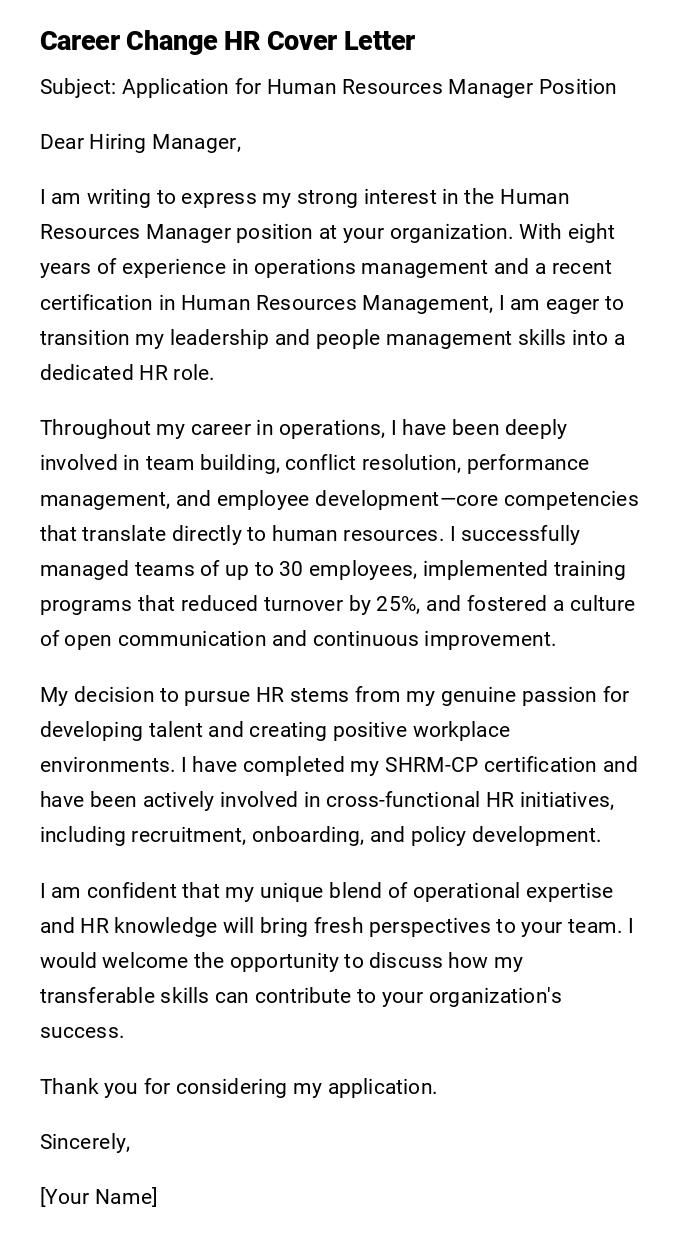
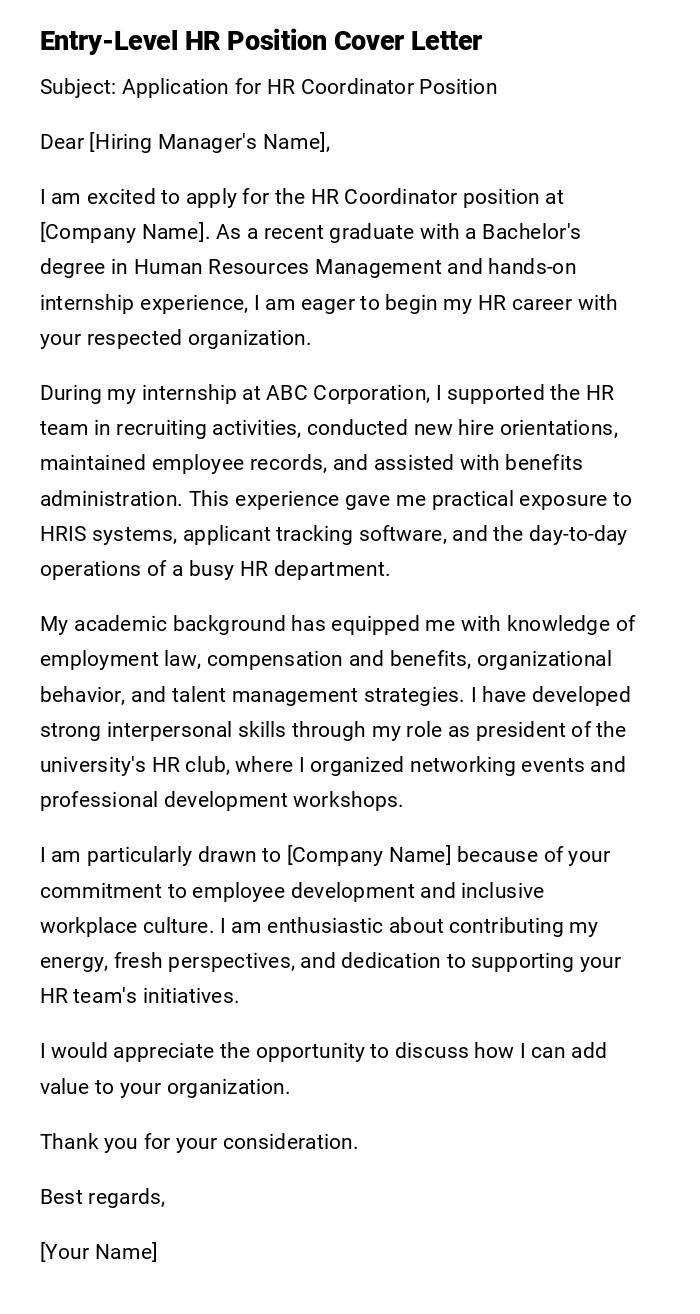
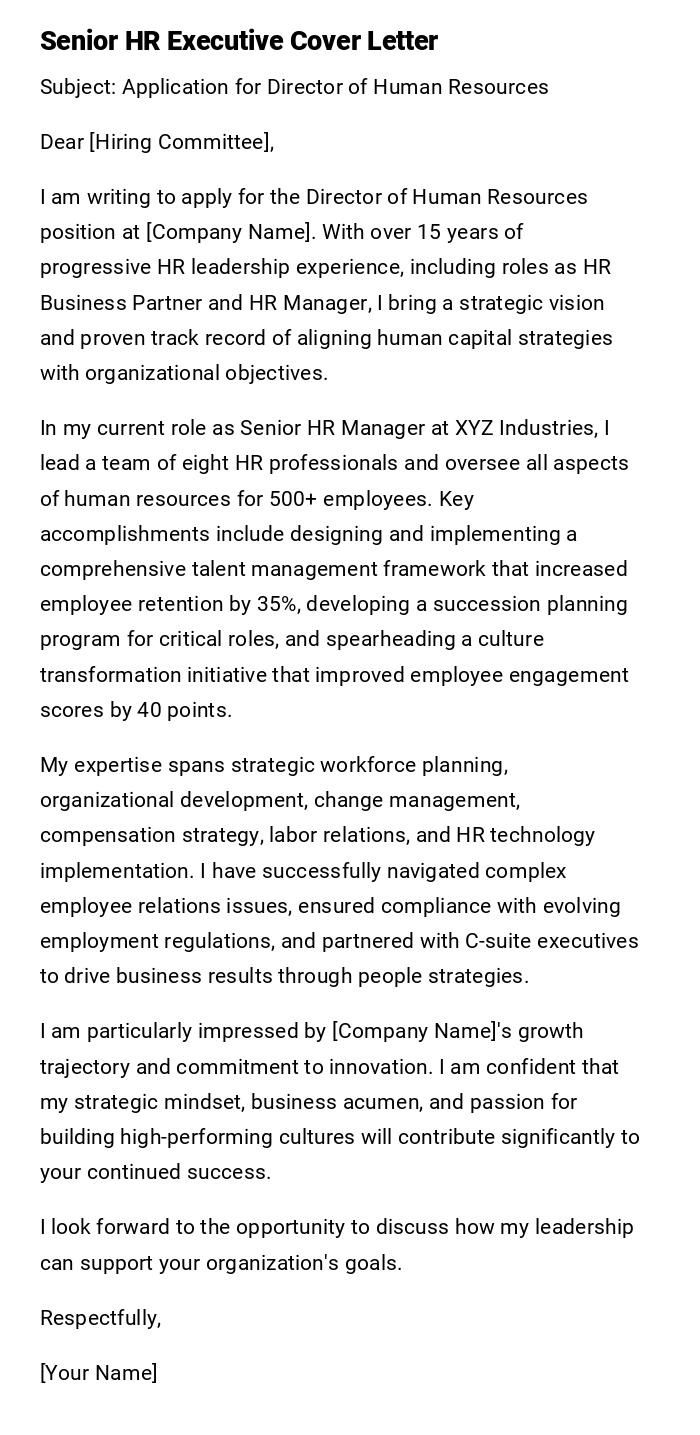
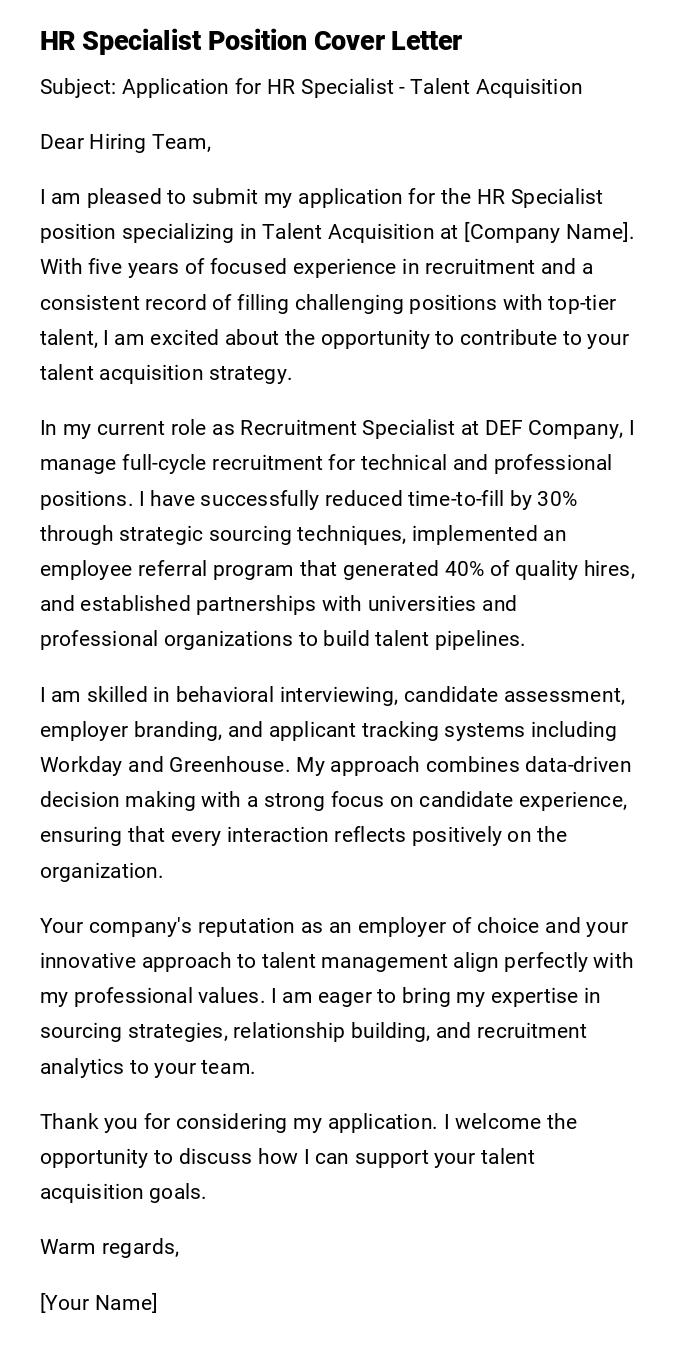
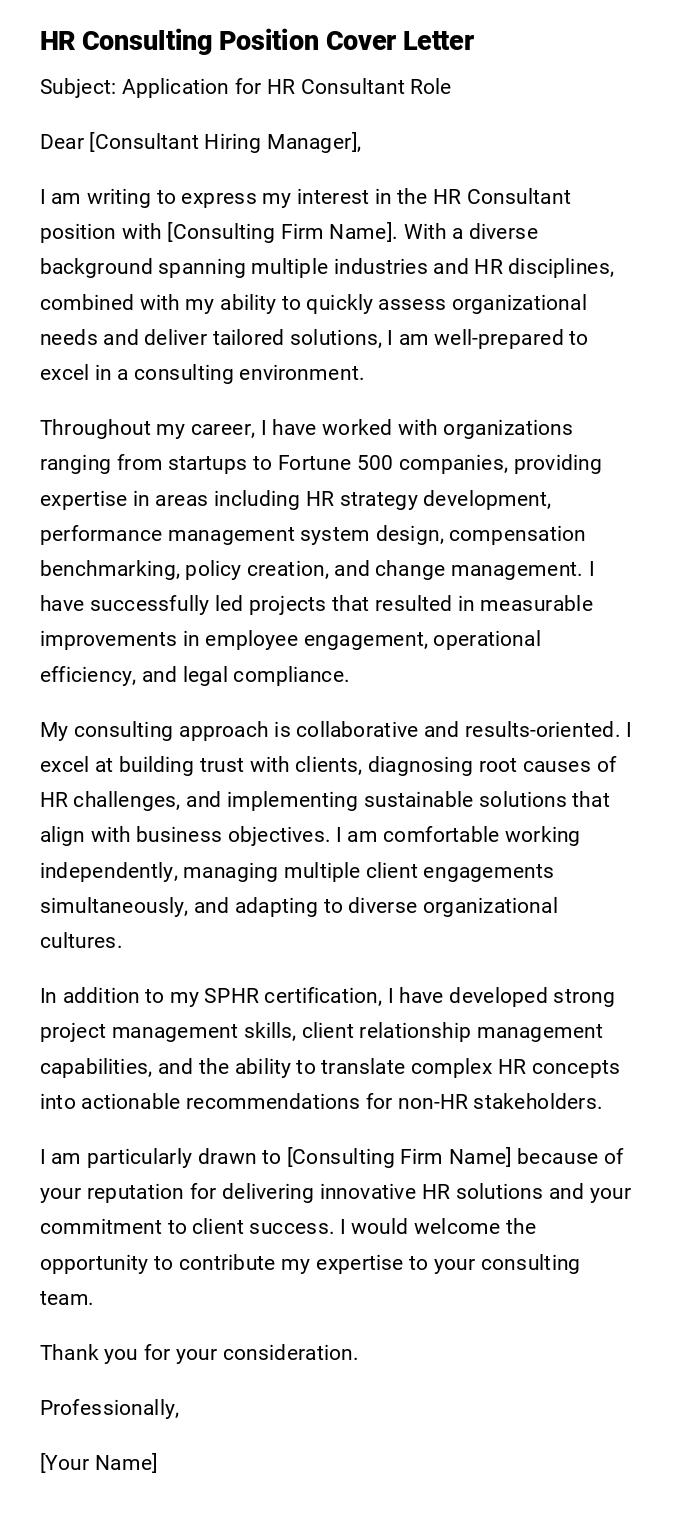
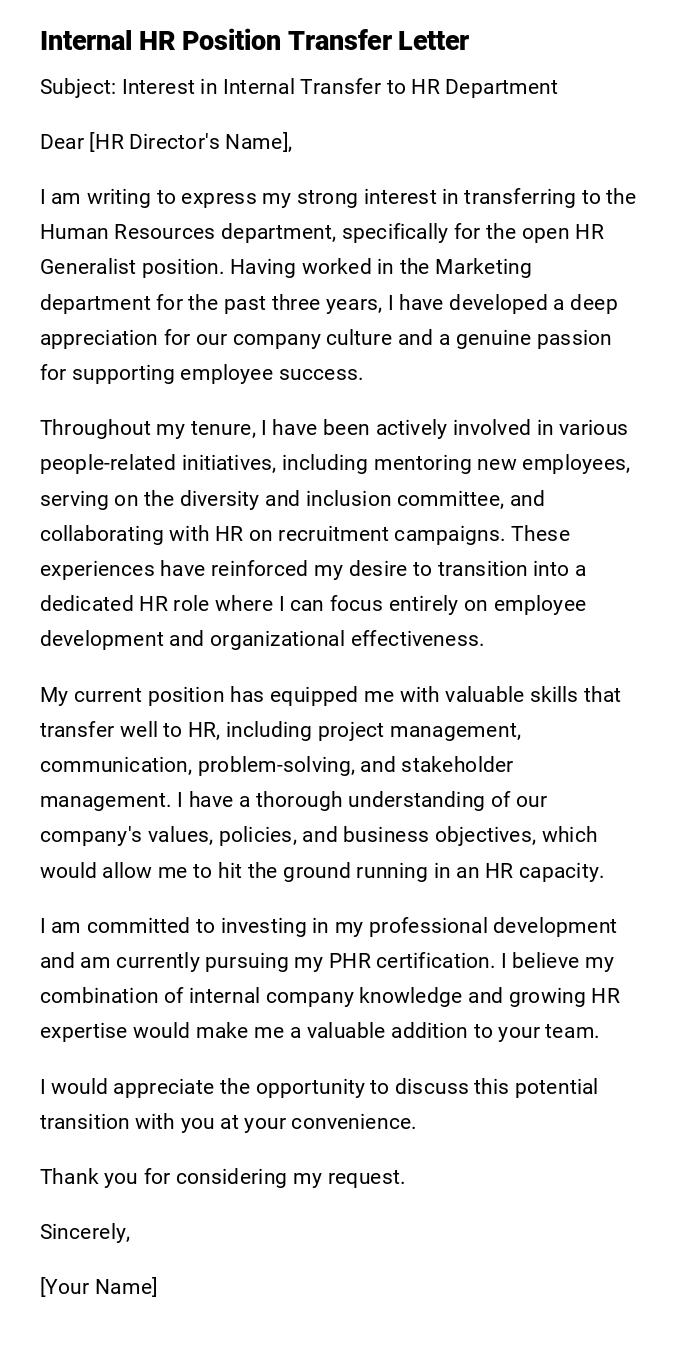
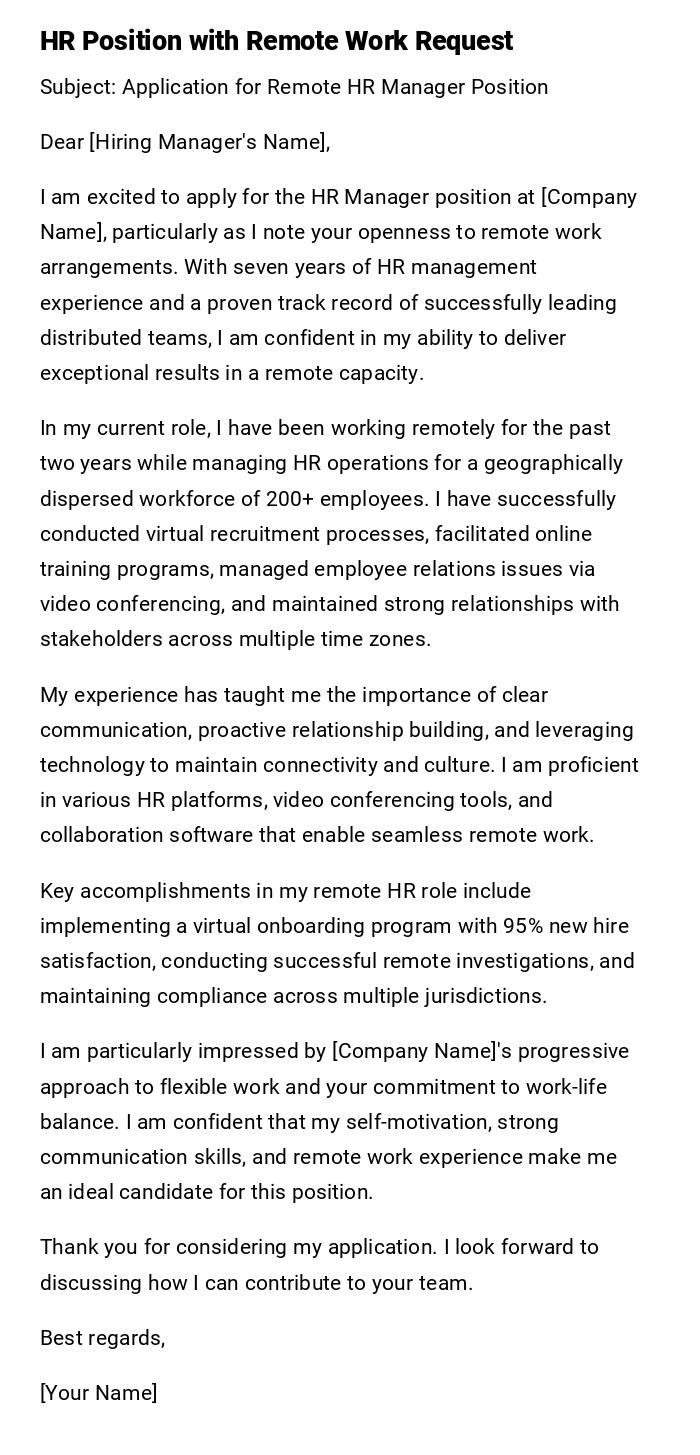

 Download Word Doc
Download Word Doc
 Download PDF
Download PDF